英语高二下北师大版Unit21《Human Biology》(Lesson 1)课件3
文档属性
| 名称 | 英语高二下北师大版Unit21《Human Biology》(Lesson 1)课件3 |  | |
| 格式 | zip | ||
| 文件大小 | 252.5KB | ||
| 资源类型 | 教案 | ||
| 版本资源 | 北师大版 | ||
| 科目 | 英语 | ||
| 更新时间 | 2013-03-11 21:02:00 | ||
图片预览

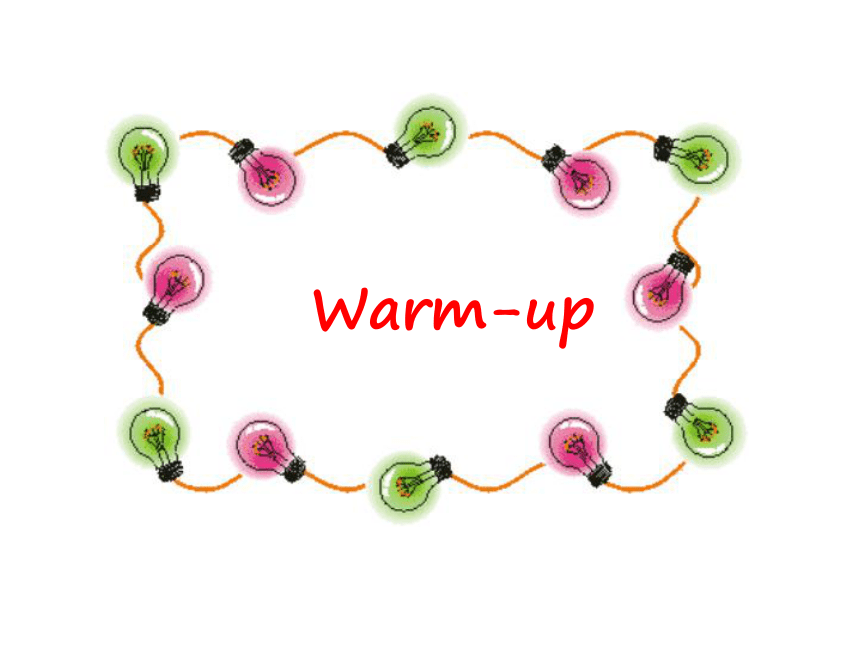
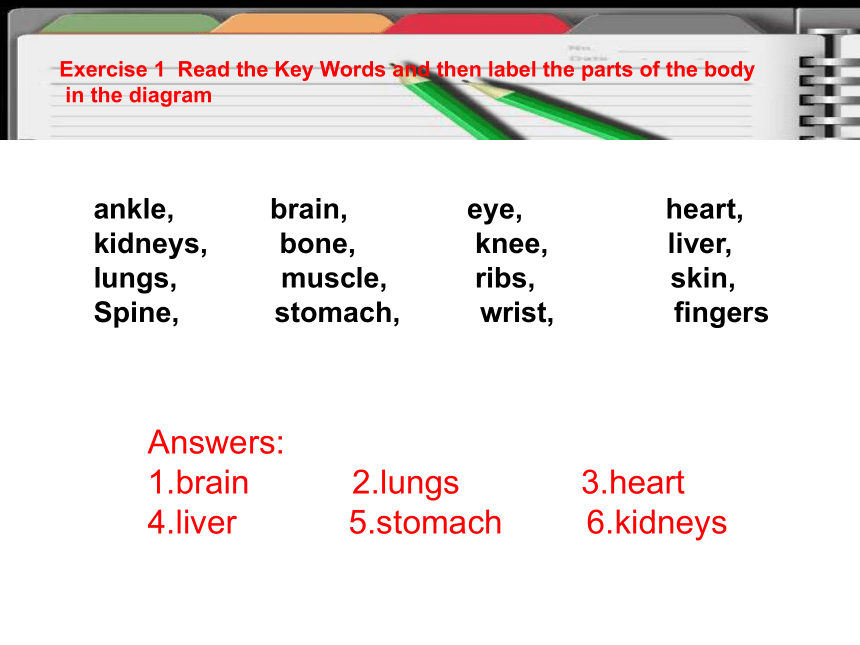
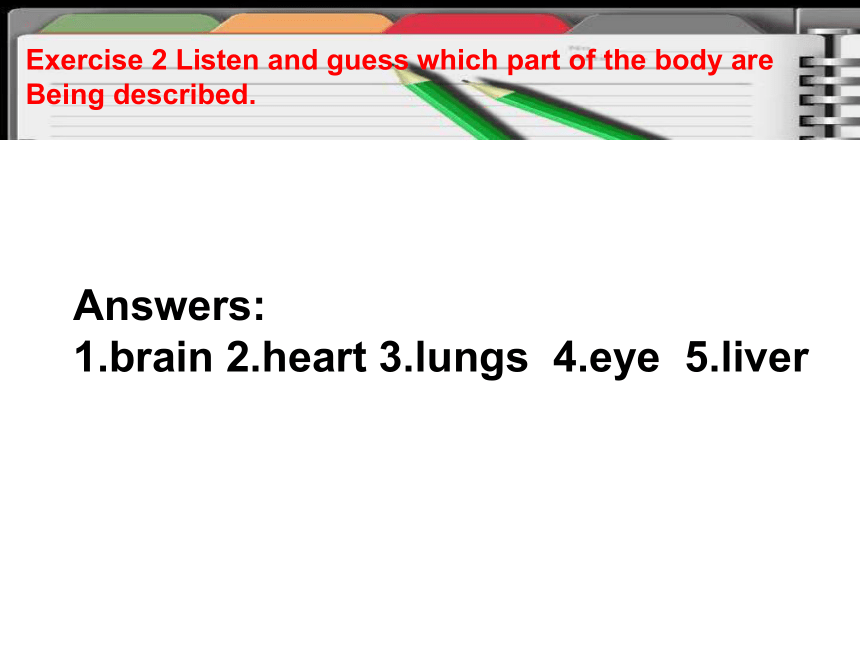
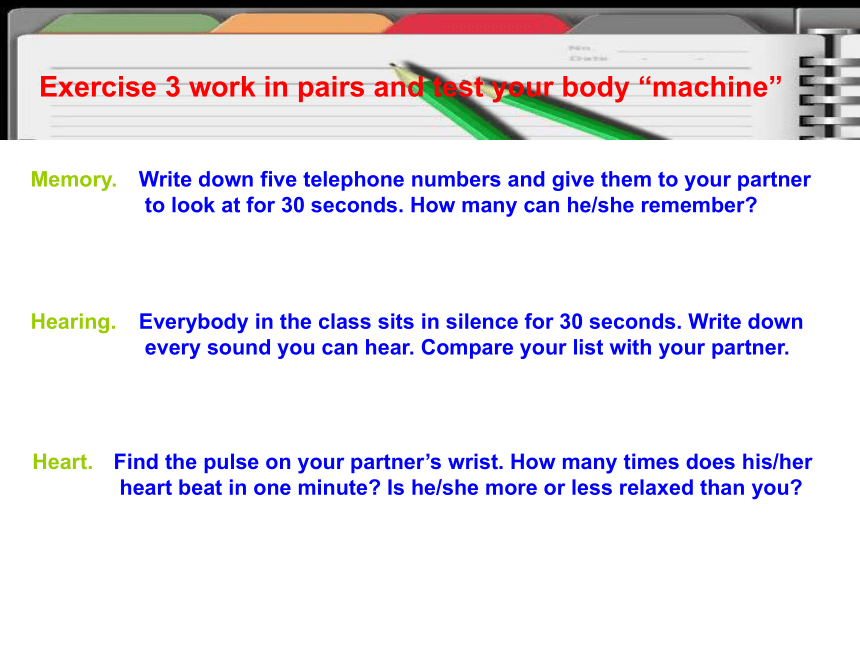
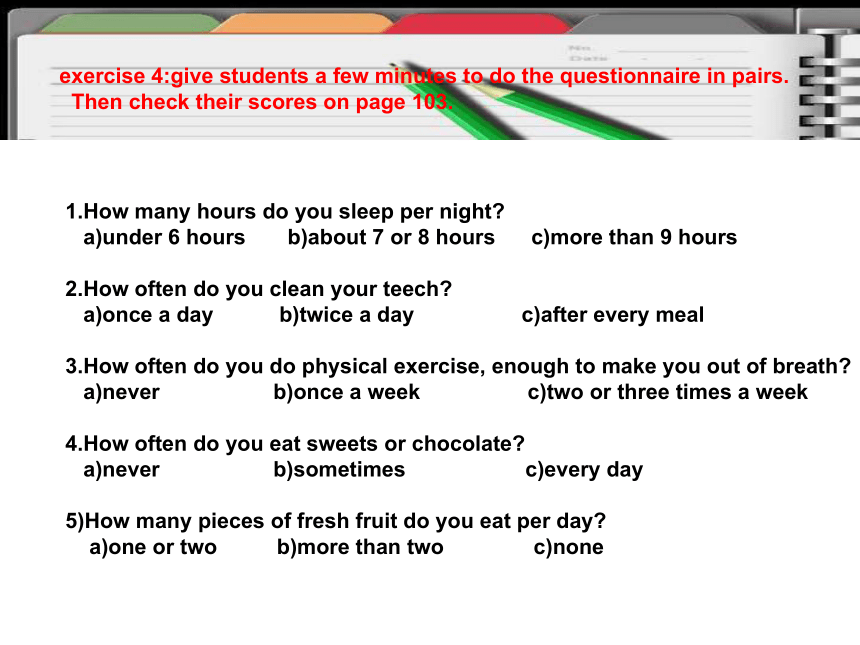
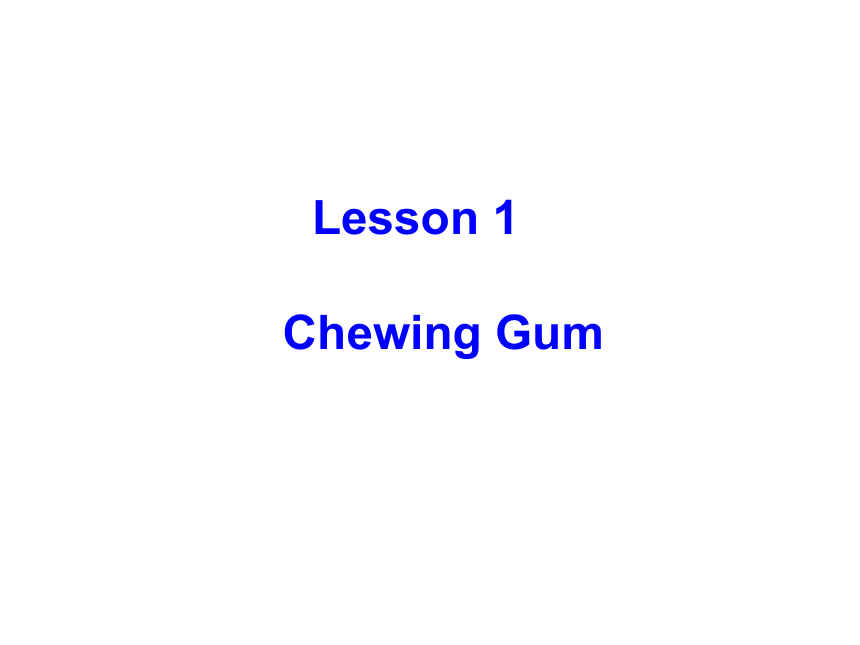

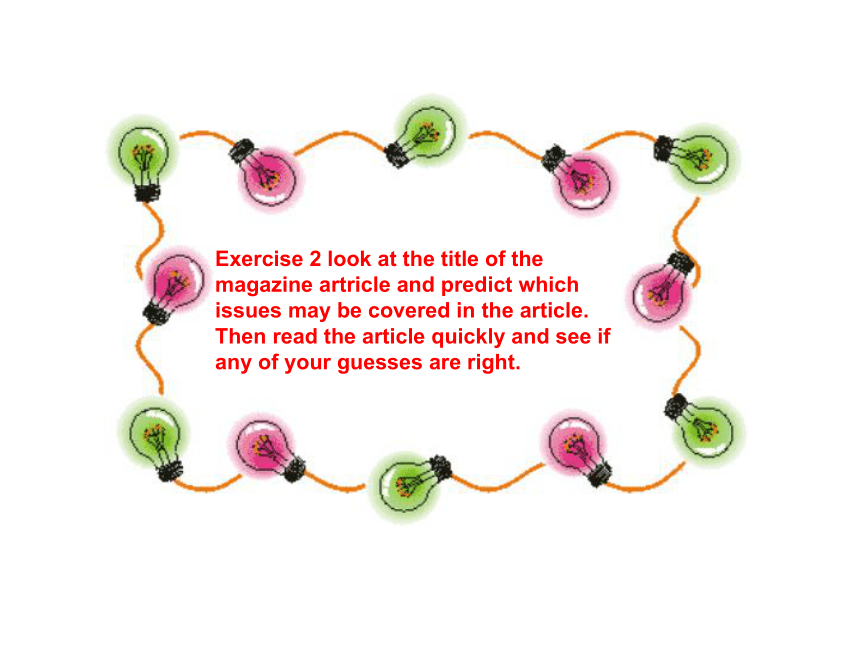
文档简介
课件26张PPT。Unit 21 Human BiologyLesson 1 Chewing GumWarm-upExercise 1 Read the Key Words and then label the parts of the body
in the diagramankle, brain, eye, heart,
kidneys, bone, knee, liver,
lungs, muscle, ribs, skin,
Spine, stomach, wrist, fingersAnswers:
1.brain 2.lungs 3.heart
4.liver 5.stomach 6.kidneysExercise 2 Listen and guess which part of the body are
Being described.Answers:
1.brain 2.heart 3.lungs 4.eye 5.liverExercise 3 work in pairs and test your body “machine”Memory.Hearing.Heart.Write down five telephone numbers and give them to your partner
to look at for 30 seconds. How many can he/she remember?Everybody in the class sits in silence for 30 seconds. Write down
every sound you can hear. Compare your list with your partner.Find the pulse on your partner’s wrist. How many times does his/her
heart beat in one minute? Is he/she more or less relaxed than you?
exercise 4:give students a few minutes to do the questionnaire in pairs.
Then check their scores on page 103.1.How many hours do you sleep per night?
a)under 6 hours b)about 7 or 8 hours c)more than 9 hours
2.How often do you clean your teech?
a)once a day b)twice a day c)after every meal
3.How often do you do physical exercise, enough to make you out of breath?
a)never b)once a week c)two or three times a week
4.How often do you eat sweets or chocolate?
a)never b)sometimes c)every day
5)How many pieces of fresh fruit do you eat per day?
a)one or two b)more than two c)none Lesson 1
Chewing GumExercise1 discuss in pairs and answer the following questions1.What do you think of chewing gum?
is it good or bad for you?
2.Do you or your friends/family buy it? why?
3.What do you do after chewing it?Exercise 2 look at the title of the magazine artricle and predict which issues may be covered in the article. Then read the article quickly and see if any of your guesses are right.Exercise 3 complete the table:Exercise 4 answer the questions1.How serious is the problem of bad breath?
2.What is added to sugar-free chewing gum which may help prevent
tooth problems?
3.According to one research project, what is one way of burning 70
kilocalories?
4.What would be the effect on the stomach of constant chewing?
5.What other activities are stated that are better than chewing gum?It is a problem for 50% of the world’s population.Chlorophyll Chewing 100 times per minute for 12 minutes.The stomach may become strained and eventually this could
lead to stomach irritations or ulcers.Brush teeth regularly,eat healthy foods avoiding sugar, never start
smoking, and chew a mint leaf.Language points1) Diet specialists regularly inform us that it is important
to chew our food properly.
营养学家们经常告诫我们一定要正确咀嚼食物。
句型:It is +adj.+to do sth.
It是形式主语,动词不定式是真正的主语.
2) it will help our bodies digest it better.
这样才能有助于身体更好地消化食物.
help sb.do sth.
3) does chewing gum have any effect on this process?
咀嚼口香糖对这一过程有什么影响呢?
Have any effect on … 4) one obvious benefit of chewing gum is that it fights
bad breath.
一个显而易见的好处是嚼口香糖能清除口腔异味.
that 引导的是表语从句.
bad breath口腔异味
5) if it has green plants materials added to it.
have sth done.
add to
6) tooth decay 蛀牙
7) wash away清除 8)lose weight减肥
9)carry out进行,执行,开展
10)up to 一直到,等于
11)by now到如今
12)today,there are gum products that help smokers
give up their bad habit.
that引导的定语从句修饰gum products,在从句中作主语.
give up放弃13)the negative side of
14)the production of stomach acid and digestive juices
15)it has also been proven that chewing gum
for long periods of time means that the body does not
have time to rest.
第一个that引导的宾语从句,作proven的宾语
第二个that引导也是宾语从句,作means的宾语
16)lead to
17)some…others….18)send out v.发送, 派遣, 放出
19)instead of 代替
20)brush one’s teeth 刷牙
21)the number of …的数目;数量
22)on balance adv.总而言之grammarconditionals revision Exercise 6 match the conditional sentences in italics in the text
with the following types:Zero conditional
1st conditional
2nd conditional
3rd conditional
Which of the sentences in italics talk about the past, the present
and the future?
1.They suggest that if we chew our food until it is soft in our mouths and then
swallow it , it will help pur bodies digest it better.
2.According to some doctors, if these people were to chew sugar-free gum,
it would help fight this embarrassing condition.
3.Recently ,some dentists have also claimed that sugar-free gum, if it has
green plants materials added to it, helps to stop tooth decay.
4.therefore, they say, if people were to chew sugar-free gum after a meal, it
would help prevent tooth trouble.
5.Further research has been carried out, which shows that, if you had chewed
sugar-free gum regularly for the last year,it is possible that you would have
lost up to 5 kilos by now.
1st conditional ,future2st conditional ,futurezero conditional ,present2st conditional ,future3st conditional ,past6.They found if people chewed 100 times per minute for 12 minutes,70 kilocalories
were burned.
7.One former smoker has appeared in an ad. Saying,”if I had used this chewing
gum when I was giving up smoking ten years ago, I would have been more
successful at quitting quickly and much healthier today.”
8. If we chew gum, it will cause our bodies to believe we are digesting food and
our stomachs will produce digestive juices unnecessarily.
9. If this is the case, the stomach may become tense.
10.They argued that if dentists encouraged its use, the wrong message would be
sent out and children might chew gum instead of brushing their teeth.
11. Unless we are careful, the number of young people with bad teeth will rise and
this will become a serious problem.2st conditional ,present1st conditional ,future3st conditional ,pastzero conditional ,present2st conditional ,future1st conditional ,futureExercise 7 read the sentences. Do they describe situations that are:
a)true or could possibly happen?
b)imaginary,unreal or contrary to facts?1.If I had used this chewing gum when I was giving up smoking
ten years ago, I would have been more successful at quitting
quickly and much healthier today.
2.If people were to chew sugar-free gum after a meal, it would
help prevent tooth trouble.
3.If dentists encouraged its use, the wrong message would be
sent out.
4.If you had chewed sugar-free gum regularly for the last year,
it is possible that you would have lost up to 5 kilos by now.babaExercise 8 complete the table:Homeworknew words
and do exercises
on page 80-81Bye-bye
in the diagramankle, brain, eye, heart,
kidneys, bone, knee, liver,
lungs, muscle, ribs, skin,
Spine, stomach, wrist, fingersAnswers:
1.brain 2.lungs 3.heart
4.liver 5.stomach 6.kidneysExercise 2 Listen and guess which part of the body are
Being described.Answers:
1.brain 2.heart 3.lungs 4.eye 5.liverExercise 3 work in pairs and test your body “machine”Memory.Hearing.Heart.Write down five telephone numbers and give them to your partner
to look at for 30 seconds. How many can he/she remember?Everybody in the class sits in silence for 30 seconds. Write down
every sound you can hear. Compare your list with your partner.Find the pulse on your partner’s wrist. How many times does his/her
heart beat in one minute? Is he/she more or less relaxed than you?
exercise 4:give students a few minutes to do the questionnaire in pairs.
Then check their scores on page 103.1.How many hours do you sleep per night?
a)under 6 hours b)about 7 or 8 hours c)more than 9 hours
2.How often do you clean your teech?
a)once a day b)twice a day c)after every meal
3.How often do you do physical exercise, enough to make you out of breath?
a)never b)once a week c)two or three times a week
4.How often do you eat sweets or chocolate?
a)never b)sometimes c)every day
5)How many pieces of fresh fruit do you eat per day?
a)one or two b)more than two c)none Lesson 1
Chewing GumExercise1 discuss in pairs and answer the following questions1.What do you think of chewing gum?
is it good or bad for you?
2.Do you or your friends/family buy it? why?
3.What do you do after chewing it?Exercise 2 look at the title of the magazine artricle and predict which issues may be covered in the article. Then read the article quickly and see if any of your guesses are right.Exercise 3 complete the table:Exercise 4 answer the questions1.How serious is the problem of bad breath?
2.What is added to sugar-free chewing gum which may help prevent
tooth problems?
3.According to one research project, what is one way of burning 70
kilocalories?
4.What would be the effect on the stomach of constant chewing?
5.What other activities are stated that are better than chewing gum?It is a problem for 50% of the world’s population.Chlorophyll Chewing 100 times per minute for 12 minutes.The stomach may become strained and eventually this could
lead to stomach irritations or ulcers.Brush teeth regularly,eat healthy foods avoiding sugar, never start
smoking, and chew a mint leaf.Language points1) Diet specialists regularly inform us that it is important
to chew our food properly.
营养学家们经常告诫我们一定要正确咀嚼食物。
句型:It is +adj.+to do sth.
It是形式主语,动词不定式是真正的主语.
2) it will help our bodies digest it better.
这样才能有助于身体更好地消化食物.
help sb.do sth.
3) does chewing gum have any effect on this process?
咀嚼口香糖对这一过程有什么影响呢?
Have any effect on … 4) one obvious benefit of chewing gum is that it fights
bad breath.
一个显而易见的好处是嚼口香糖能清除口腔异味.
that 引导的是表语从句.
bad breath口腔异味
5) if it has green plants materials added to it.
have sth done.
add to
6) tooth decay 蛀牙
7) wash away清除 8)lose weight减肥
9)carry out进行,执行,开展
10)up to 一直到,等于
11)by now到如今
12)today,there are gum products that help smokers
give up their bad habit.
that引导的定语从句修饰gum products,在从句中作主语.
give up放弃13)the negative side of
14)the production of stomach acid and digestive juices
15)it has also been proven that chewing gum
for long periods of time means that the body does not
have time to rest.
第一个that引导的宾语从句,作proven的宾语
第二个that引导也是宾语从句,作means的宾语
16)lead to
17)some…others….18)send out v.发送, 派遣, 放出
19)instead of 代替
20)brush one’s teeth 刷牙
21)the number of …的数目;数量
22)on balance adv.总而言之grammarconditionals revision Exercise 6 match the conditional sentences in italics in the text
with the following types:Zero conditional
1st conditional
2nd conditional
3rd conditional
Which of the sentences in italics talk about the past, the present
and the future?
1.They suggest that if we chew our food until it is soft in our mouths and then
swallow it , it will help pur bodies digest it better.
2.According to some doctors, if these people were to chew sugar-free gum,
it would help fight this embarrassing condition.
3.Recently ,some dentists have also claimed that sugar-free gum, if it has
green plants materials added to it, helps to stop tooth decay.
4.therefore, they say, if people were to chew sugar-free gum after a meal, it
would help prevent tooth trouble.
5.Further research has been carried out, which shows that, if you had chewed
sugar-free gum regularly for the last year,it is possible that you would have
lost up to 5 kilos by now.
1st conditional ,future2st conditional ,futurezero conditional ,present2st conditional ,future3st conditional ,past6.They found if people chewed 100 times per minute for 12 minutes,70 kilocalories
were burned.
7.One former smoker has appeared in an ad. Saying,”if I had used this chewing
gum when I was giving up smoking ten years ago, I would have been more
successful at quitting quickly and much healthier today.”
8. If we chew gum, it will cause our bodies to believe we are digesting food and
our stomachs will produce digestive juices unnecessarily.
9. If this is the case, the stomach may become tense.
10.They argued that if dentists encouraged its use, the wrong message would be
sent out and children might chew gum instead of brushing their teeth.
11. Unless we are careful, the number of young people with bad teeth will rise and
this will become a serious problem.2st conditional ,present1st conditional ,future3st conditional ,pastzero conditional ,present2st conditional ,future1st conditional ,futureExercise 7 read the sentences. Do they describe situations that are:
a)true or could possibly happen?
b)imaginary,unreal or contrary to facts?1.If I had used this chewing gum when I was giving up smoking
ten years ago, I would have been more successful at quitting
quickly and much healthier today.
2.If people were to chew sugar-free gum after a meal, it would
help prevent tooth trouble.
3.If dentists encouraged its use, the wrong message would be
sent out.
4.If you had chewed sugar-free gum regularly for the last year,
it is possible that you would have lost up to 5 kilos by now.babaExercise 8 complete the table:Homeworknew words
and do exercises
on page 80-81Bye-bye
